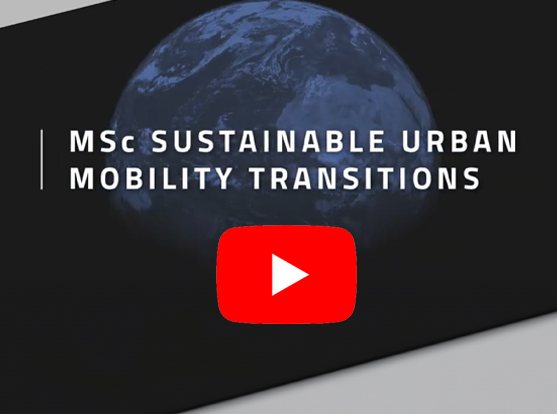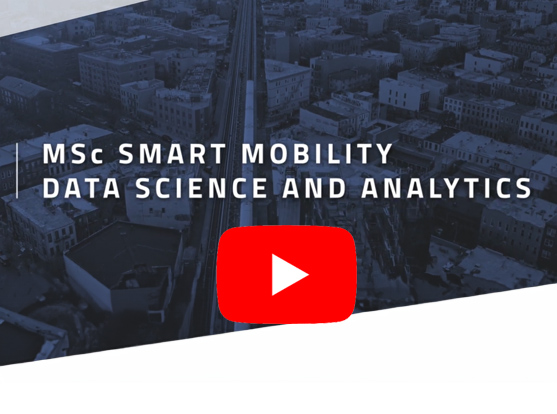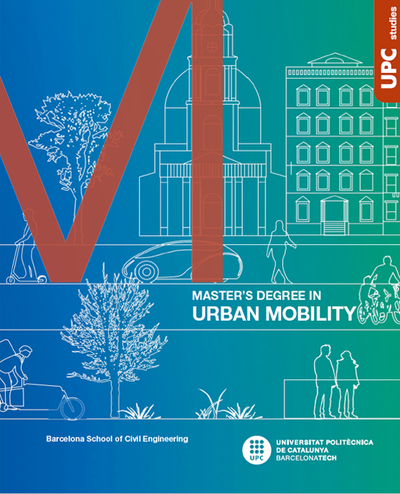Master's Degree in Urban Mobility
The Master's Degree in Urban Mobility improves global urban mobility through technical infrastructure upgrades and holistic planning. The program trains engineers in transportation operations, mobility services, data science, ICT, and energy technologies for sustainable mobility. It also provides fundamental tools for entrepreneurship and innovation in today's rapidly changing society.
The Urban Mobility master's degree is available as an official master at UPC-BarcelonaTech (i.e "Local version"; 2 years at UPC-BarcelonaTech) or through the EIT Urban Mobility Master School (i.e. "EIT version"; 1 year at UPC-BarcelonaTech + 1 year at another European university). For details on each program, see the Admission section. Enrollment periods may vary.
This master’s degree program includes a minor in Innovation and Entrepreneurship (I&E) and offers 3 intensifications (or tracks), which are:
- Sustainable Urban Mobility Transitions (request webinar)
- Smart Mobility Data Science & Analytics (more information, request webinar)
- Business Engineering in Urban Mobility (more information, request webinar)
This master's program enables a dual degree with the Master's Degree in Civil Engineering (MECCP + MUM) for the local version of it.
Academic year starts in
September
Duration
2 years
Study load
120 ECTS (including the Master's Final Thesis)
Delivery
On-campus
Language
English
Places
60
Official degree
Master's Degree in Urban Mobility by the Universitat Politècnica de Catalunya (recorded in the Spanish Ministry of Education's degree register)
Fees
More information about fees and payment options
More information about grants and loans
Academic coordinator
Miquel Estrada (EIT coordinator and Barcelona School of Civil Engineering coordinator)
Track coordinators
- Sustainable Urban Mobility Transitions
Francesc Soriguera - Smart Mobility Data Science & Analytics
Lídia Montero - Business Engineering in Urban Mobility
Miquel Estrada
Contact at EIT Urban Mobility Master's School
Specific admission requirements at UPC-BarcelonaTech (local version)
In order to gain local admission to the Master's Degree in Urban Mobility at UPC-BarcelonaTech, the following requirements must be met:
Direct admission
Holders of the following qualifications may be admitted to the master's degree directly, without having to take bridging courses:
- Bachelor's degrees in engineering (Industrial Engineering, Civil Engineering, Construction Engineering, Telecommunications Engineering, Informatics Engineering, Engineering Physics, other engineering fields).
- Pre-EHEA and second-cycle degrees (Industrial Engineering, Civil Engineering, Telecommunications Engineering, Informatics Engineering, Engineering Physics, other engineering fields).
- Pre-EHEA degrees in Architecture.
Students with other bachelor degrees in science or engineering may still be admitted. Bridging courses can be proposed after a specific analysis during the admissions process.
English level B2
Given that the master’s degree is taught entirely in English, CEFR English Level B2 is required and can be demonstrated by providing proof of any of the following:
- English is your mother tongue.
- You have studied in an English-speaking country (for at least a semester).
- You have taken an academic university programme taught in English (for at least a semester).
- You are the holder of a qualification awarded by an institution in the European Higher Education Area that includes English Level B2.
- You are in possession of one of the English-language certificates listed below.
- Cambridge: FCE
- TOEFL PBT:> = 567; TCC:> = 227; IBT:> = 87
- IELTS: 5.5
- TOEIC: 750
- Escola Oficial d’Idiomes: Advanced level certificate (Level 5)
An English B2 certificate can also be obtained at UPC-BarcelonaTech.
Students pending obtaining the degree that gives access to the master's degree
UPC undergraduate students who, despite not having obtained the bachelor’s degree, have pending the TFG and, at most, up to 9 ECTS (including credits pending recognition or transfer) or who have completed their studies, but are waiting to achieve, if possible, transversal competence in a third language. Under no circumstances will students who access this route be able to obtain a master's degree if they have not previously obtained a bachelor's degree.
Candidates from other universities who are enrolled in all the credits to complete the studies that give access to the master's degree can apply for access. Acceptance will be conditioned to the fulfillment of the general and specific access and admission requirements at the time of formalizing the registration.
You will find all the information about the general Access requirements to UPC master's programs here.
Admission criteria at UPC-BarcelonaTech
The academic records of applicants are reviewed by the academic committee, which selects the applicants to be admitted directly and those who must take bridging courses because they do not have the necessary knowledge and skills. The admission criteria are the academic record (60%), professional experience (10%), the English-language level, if it is above the minimum level required for admission to the master's degree (15%), and the correspondence between the competencies of the entrance qualification and the competencies of this master's degree (15%).
Specific admission for EIT Urban Mobility Master School programme
The Master’s Degree in Urban Mobility can be studied as an EIT Urban Mobility master’s programme. Applications and tuition fee payments are made directly to the EIT Urban Mobility Master School.
The EIT Urban Mobility Master School programmes have a different and unique study path. The first year (entry year) is taken at one of the universities in the consortium (60 ECTS), while the second year (exit year) is taken at a different university (60 ECTS). Between the first and second year, students will participate in a Summer School, applying new skills to two different cities in Europe. To complete their degree, in the second year, students will carry out an independent master thesis, combining and demonstrating their full set of technical and entrepreneurial skills. Students graduate with two officially recognized Master of Science degrees from each of the two universities. They are also awarded the EIT Label certificate by the European Institute of Innovation and Technology.
Applications period:
- Period 1: Mid November to late January.
- Period 2: Early February to mid April.
Complete information about the programmes, courses offered, scholarships, tuition fees and application requirements is provided by EIT Urban Mobility Master School.
Local master's degree programme at UPC-BarcelonaTech
The programme can be taken at UPC-BarcelonaTech in its entirety (2 years, 120 ECTS) and thus must follow UPC-BarcelonaTech's pre-enrolment process.
The application period at UPC-BarcelonaTech starts by mid January and ends by late Juny.
Career opportunities
Graduates may find employment in logistics, transport management, mobility and sustainability departments in public bodies, mobility operators, urbanism, consultancy, the automobile sector, private mobility services, etc.
Their potential future careers are as urban planners and designers of public spaces, planners of sustainable mobility policies, advisors in private and public companies in the sector, designers and managers of mobility services, mobility energy strategists, citizen participation coordinators and international mobility project managers.
They will have high-level competencies in entrepreneurship and innovation and may develop business initiatives on a self-employed basis or set up a business.
Learning objectives
Generic competencies
Generic competencies are the skills that graduates acquire regardless of the specific course or field of study. The generic competencies established by UPC-BarcelonaTech are capacity for innovation and entrepreneurship, sustainability and social commitment, knowledge of a foreign language (preferably English), teamwork and proper use of information resources.
Specific competencies
- To analyse and design mobility and logistics services, in whole or in part, by applying methods, techniques and tools that are appropriate for specific functions and aims.
- To design procedures for collecting mobility data that take into consideration their specificity, and to apply appropriate techniques for processing them, analysing them and drawing conclusions from them so that they can be used in the models that require them.
- To design and carry out demand analysis studies, and to model demand and its structure in accordance with mobility models.
- To apply modelling, optimisation and simulation techniques for solving problems that arise in mobility design, operation and management.
- To diagnose the implications of globalisation phenomena and changes in markets for the operation of supply chains.
- To calculate fundamental variables in transport and mobility systems that affect the safety, quality and sustainability of transport infrastructure and the optimisation of the functioning of these systems.
- To plan, manage and operate transport and mobility systems, and to analyse the levels of service to users, operating costs and the social and environmental impacts of public passenger transport, traffic, private vehicles, air transport, maritime transport, intermodal transport and urban mobility.
- To identify the future consequences of short- and long-term plans and decisions from an integrated scientific, ethical and intergenerational perspective, and to bring these elements together in a solution-based approach to advance towards a sustainable society. (Specific competency of the Innovation and Entrepreneurship specialisation)
- To translate innovations into viable business solutions. (Specific competency of the Innovation and Entrepreneurship specialisation)
- To foster one's ability to think beyond pre-established limits and systematically explore and generate new ideas. (Specific competency of the Innovation and Entrepreneurship specialisation)
- To apply knowledge, ideas and technology to create or significantly improve new products, services, processes, policies, business models and jobs. (Specific competency of the Innovation and Entrepreneurship specialisation)
- To use and apply cutting-edge research methods, processes and techniques to create and grow new businesses and in interdisciplinary teams and contexts. (Specific competency of the Innovation and Entrepreneurship specialisation)
- To transform practical experiences into research problems and challenges. (Specific competency of the Innovation and Entrepreneurship specialisation)
- To make decisions and foster one's leadership abilities on the basis of a holistic understanding of the contributions of higher education, research and businesses to value creation, in teams and contexts that are limited in size or scope. (Specific competency of the Innovation and Entrepreneurship specialisation)
- To carry out and present and defend before an examination committee an original, individual piece of work consisting of an urban mobility project, of a professional or research nature, that synthesises and integrates the competencies acquired on the master's degree.
- A capacity for the planning, management and operation of civil engineering infrastructure.
Below are the courses that are offered at UPC-BarcelonaTech for the first and second year.
Must enrol in a total of 60 ECTS distributed into 30 ECTS in the fall semester and 30 ECTS in the spring semester. In the spring semester students must enrol 10 ECTS of elective subjects from the chosen track.
| Fall semester | |
| Mandatory | ECTS |
| 250MUM010 Introduction to supply chain | 5 |
| 250MUM011 Mobility modeling | 5 |
| 250MUM012 Operation & management of transport systems | 5 |
| 250MUM013 Data analysis in transport systems | 5 |
| I&E Elective (must enrol 10 ECTS) | ECTS |
| 250MUM014 Decision making & economy in urban mobility | 5 |
| 250MUM028 Innovation & entrepreneurship for world challenges | 5 |
| Spring semester | |
| Mandatory | ECTS |
| 250MUM001 Liveable cities & urban mobility | 5 |
| 250MUM015 Travel demand & behavioral modeling | 5 |
| I&E Elective (must enrol 10 ECTS) | ECTS |
| 250MUM002 Project based on an innovation challenge | 10 |
| Electives of track (must enrol 10 ECTS from the same chosen track) | ECTS |
| Sustainable urban mobility transitions track | |
| 250MUM016 Public transport | 5 |
| 250MUM017 Optimization models for transportation networks | 5 |
| 250MUM018 Traffic simulation models | 5 |
| 250MUM019 Railway transport | 5 |
| 250MUM020 Sustainable mobility | 5 |
| 250MUM027 Port management & maritime transport | 5 |
| Smart Mobility Data Science & Analytics track | |
| 250MUM007 Data management for transportation | 4 |
| 270957UM Machine Learning | 6 |
| Fall semester | |
| I&E Elective (must enrol 10 ECTS) | ECTS |
| 230639UM Technology asset management | 5 |
| 250MUM029 Product or service development project | 2 |
| 250MUM030 Innovative solutions to mobility business challenges (recognized by EIT Summer School) | 3 |
| 250MUM006 Case studies in urban mobility | 5 |
| Electives of track (must enrol 20 ECTS from the same chosen track) | ECTS |
| Sustainable urban mobility transitions track | |
| 250MUM021 Mobility & development | 5 |
| 250MUM022 Transports of goods | 5 |
| 250MUM023 Traffic | 5 |
| 250MUM024 Airport management | 5 |
| 250MUM025 Vehicle routing models | 5 |
| 250MUM026 Smart mobility (SMART) | 5 |
| Smart Mobility Data Science & Analytics track | |
| link to elective courses | |
| For more information please contact Prof. Lidia Montero. | |
| Spring semester | |
| Mandatory | ECTS |
| 250MUMTFM Master's thesis | 30 |
| I&E Elective | ECTS |
| 270682 Viability of business project | 6 |
Students enrolled at UPC-BarcelonaTech for the Master's Degree in Urban Mobility can access the following information:
Simulate your schedule with the UPC's schedule viewer
Choose the courses you want to study and simulate how your schedule will be:
The Master's Thesis is an original exercise to be done individually and presented and defended before a university panel consisting in a project in the sphere of the specific urban mobility synthesising and integrating the competences acquired on the course.
If the student takes the master thesis outside the UPC (and it is also evaluated in another university), then, to incorporate the qualification at UPC it is necessary:
- Enrollment at the UPC and enrollment also at the destination university of the Master's Thesis.
- Master's Thesis abstract, original document signed and stamped and sent by email to masters.camins@upc.edu. If the file does not incorporate an authenticated digital electronic signature, deliver the signed and stamped original.
- Upload the work to Atenea TFE.
- Master's thesis qualification certificate issued by the official destination university. Please send a digital copy, if the center has an authenticated digital electronic signature, if not, please send the original certificate on paper.
Scheduled theses
These are the master theses' currently scheduled and validated:
Related links
Institutional information
- Data on the faculty
- Data on the degree
- System of Guarantee of Degree Quality
Contact





Share: